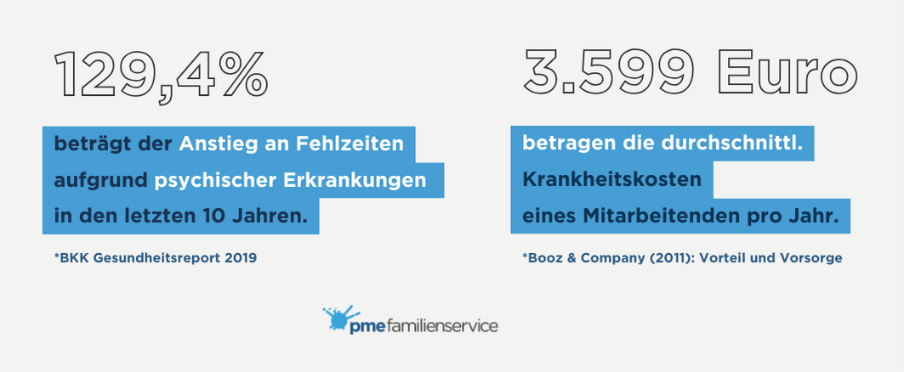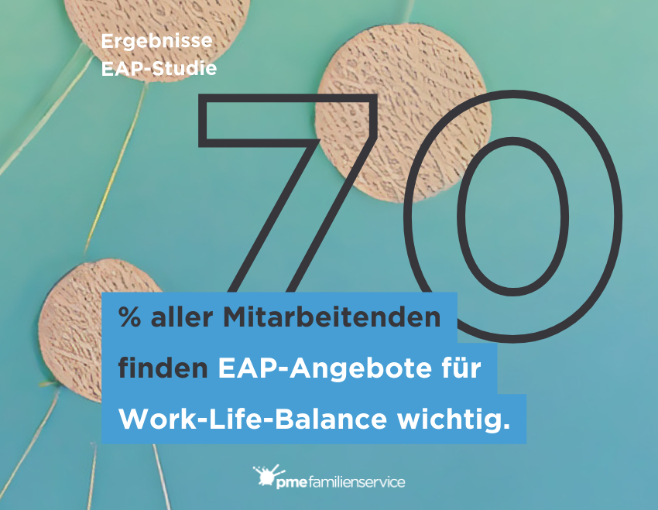 11.08.2025
11.08.2025  Sabrina Ludwig
Sabrina Ludwig  33134
33134
What is an Employee Assistance Program (EAP)?
Mental stress, conflicts at work, debts, family disputes: EAP employee counseling supports employees with private and professional problems. This promotes health and motivation, reduces absenteeism and takes the pressure off managers. A win-win situation for employees and employers.
What is an Employee Assistance Program (EAP)?
An Employee Assistance Program supports employees in professional, private and health crises and challenges - in most cases through external employee counseling.
An EAP is suitable for companies of all shapes and sizes and is generally part of occupational health management, as it increases the health, motivation and satisfaction of employees. EAPs are available 24/7 via a hotline and a trained team of experts. The counseling topics range from psychological stress to family difficulties and addiction problems.
Arrange an EAP consultation!
Employee Assistance Programs provide a confidential and accessible platform where employees can receive professional help without worrying about consequences for their careers. The EAP counselors advise and support their clients anonymously and confidentially. The employer should not learn anything about the content of the counseling or the names of the employees.
Some companies combine internal company social counseling with the EAP services of external employee counseling.

Topics of an Employee Assistance Program?
The range of services offered by EAP providers in the DACH region varies. Many offer a "classic" EAP with psychological counseling on health, professional and personal issues.
Other service providers extend this service to include initial legal advice, arranging childcare solutions, income and budget advice, help in the home and garden and more.
EAP counseling for psychosocial issues.
- Conflicts in the workplace
- Crisis intervention, e.g. in the event of suicide
- Dealing with grief, death and loss
- Stress, burnout, depression, anxiety disorders
- Conflicts in partnership and family
- Educational issues
- Addiction and dependencies, e.g. alcohol
- Domestic violence
- Financial worries and over-indebtedness
- Questions and advice on care tasks and financing care
EAP advice on leadership and team issues:
- Communication and conflicts (in a team or with a manager)
- Time and self-management
- Mindful Leadership
- Change management
- New as a manager
- Leadership style, agile leadership
- Mindful Leadership
- Women in leadership
- Dealing with death in the workplace
Example of EAP employee counseling: divorce, debt, absenteeism
Ms. Altershoven recently separated from her partner. They have a child together and have bought a house that is not paid off. The debts for the house are pressing and Mrs. Altershoven doesn't know how she is going to pay for it alone. Dealing with their three-year-old daughter is also still difficult for the newly separated parents.
All this puts a strain on Ms. Altershoven and she sleeps badly. She is a shift manager in a construction company. Because she is exhausted, she makes mistakes more and more often. Her boss also notices this and draws the attention of her long-standing and reliable employee to the EAP counseling service
The income and budget counselors show her potential savings and where she can apply for financial support. The specialist advisors on the EAP hotline are ready to listen to the psychological stresses that are weighing on Ms. Altershoven: the separation, the feeling of being alone with everything. Together, they develop solution-oriented methods to help her cope better with the daily challenges.
Advantages and benefits: Why is an Employee Assistance Program worthwhile?
Who is an Employee Assistance Program suitable for?
The aim and purpose of an Employee Assistance Program is to support employees in times of personal and professional crisis and to help them before "minor" problems become major ones and result in chronic stress disorder, for example.
EAP counseling is not a substitute for therapy. However, it can be a good transition until a place in therapy is found. On average, the waiting time until therapy begins is five to six months. This is a very long time for people with mental illnesses. Long waiting times also increase the risk of mental illnesses worsening, prolonging or recurring. In addition, the longer the waiting time, the higher the proportion of people who give up looking for therapy.
The EAP specialist advisors do not issue sick notes or prescriptions. They also do not make diagnoses. If stress is identified that cannot be resolved through the counselling service, a qualified referral is made to specialized network partners of the EAP provider. Some EAP providers also provide support in the search for therapy places or a place in a psychiatric ward.
Managers receive professional support with difficult management issues - e.g. in dealing with mentally stressed or conspicuous employees or with personal development in their management role - as well as with their own questions from a professional or private context.
More than just EAP advice: all-in-one provider pme Familienservice
At pme Familienservice , the EAP offer goes further than the "classic" EAP. In addition to an anonymous 24/7 advice hotline, the service provider provides active support in the event of illness and the need for care (including for relatives), arranges all forms of childcare solutions, offers vacation programs and looks for help in the household and garden for its customers. www.familienservice.de/eap
Prompt provision of a suitable therapy place
While some EAP providers only provide the contact details of suitable therapy facilities, pme is actively committed to providing a suitable therapy place as soon as possible.
Systemic solution-oriented consulting
The specialist advice provided by pme Familienservice is systemic and solution-oriented, i.e. the focus is on finding solutions and opportunities for change rather than concentrating on analyzing problems. The consultants help clients to identify and use their strengths, resources and existing solutions to bring about positive change.
EAP combined with blended coaching
The EAP advisors at pme Familienservice work in a systemic, solution-oriented way and use a wide range of methods to provide the best possible support to the people who request it. The blended coaching approach combines online academy events such as lectures, seminars, group coaching sessions and e-learning with the content from the counseling sessions. This ensures that the newly acquired knowledge for solving personal issues can be implemented sustainably in everyday life.
Advantages of Employee Assistance Programs for companies
However, EAP employee counseling not only offers numerous benefits to employees, but also to companies:
1. less absenteeism: Studies show that EAPs help to reduce absenteeism due to health problems or personal crises.
2. increased productivity: By helping employees to overcome personal or professional problems, EAP counseling contributes to increased productivity.
3. improved employee retention: Companies that take care of their employees' well-being promote better retention and loyalty.
4. cost savings: By reducing absenteeism and improving work performance, companies can save costs in the long term.
5 Employer branding: Do you look after the interests of your employees? Congratulations! According to studies, this is pretty well received and helps with recruiting new employees.

Download whitepaper EAP study
What does an Employee Assistance Program cost?
The employer offers their employees the EAP service and, ideally, informs them about its use via the intranet, newsletter and/or company social media.
The service is free of charge for employees and managers and, if necessary, their relatives.
How does an EAP employee counseling session work?
The EAP counseling process is designed to provide employees with fast, confidential and effective support. By combining immediate counseling, long-term therapy options and resource referrals, employees can receive help in a variety of life situations, which in turn contributes to a healthier and more productive work environment.
EAP employee counseling typically proceeds as follows:
1. contact: Contact is often made via a hotline, e-mail or an online portal provided by the employer.
2. initial interview: In the initial meeting, the advisor first clarifies the employee's current situation: What are the reasons? Is there an acute crisis? What is the aim of the counseling? This meeting serves to establish a relationship of trust and to gain an overview of the employee's challenges. In addition, the counsellor can assess whether further help such as psychotherapy, clinics or specialized counselling centres is required and, if necessary, provide support in finding a referral.
3. counseling process/counseling sessions: After the initial meeting, the first steps towards a solution are implemented in the counseling process. This plan can comprise several sessions, usually 3 to 6, depending on the employee's needs. The focus is on developing solutions and using existing resources. The counselor supports the employee in planning and implementing concrete steps.
The sessions can take place over the phone, in person or online.
4. follow-up and support: The EAP counselor usually also provides follow-up and ongoing support to ensure that the employee is making progress and effectively using the resources provided. This may include additional counseling sessions, referrals to other service providers or support in implementing coping strategies.
5. conclusion: The counseling process usually ends when the employee has achieved the goals set or when the counselor and the employee jointly decide that no further support is required. Even after the formal counseling process has ended, the employee can often continue to access EAP services if new problems arise.
For quality assurance purposes, employees are given the opportunity to provide anonymous feedback on the advisory process after the end of the advisory process using the customer evaluation.

Implementation and use of Employee Assistance Program
Implementing a successful Employee Assistance Program requires clear communication, employee training and regular evaluation.
Companies should ensure that their employees are aware of the existence of the program and know how to access the services offered.
Possible means of communication for information are
- Information stands
- Articles and notes on the company intranet
- Onepager
- Social media, videos
- Newsletter
Arrange an EAP consultation!
Quality features of EAP providers
Choosing a good EAP provider is critical to the success of the program and employee satisfaction. Here are some quality features you can look out for when making your choice:
1. experience and reputation: Look for EAP providers with proven experience and a positive reputation in the industry. Check their track record and look for reviews or recommendations from other companies that have used their services.
2. qualification of the advisors: Make sure that the EAP provider's counselors are qualified and experienced. They should have a psychosocial degree in psychology, social work (or comparable) and specialize in topics such as stress management, addiction prevention, conflict resolution, family counseling, etc.
3. diversity of services: A good EAP provider offers a wide range of services to meet the diverse needs of employees, including psychosocial counseling, addiction counseling, financial counseling, legal counseling, childcare, career counseling, etc.
4. accessibility and availability: The EAP provider should offer easily accessible services, either through telephone hotlines, online chats, face-to-face counseling sessions or a combination of these methods. Employees should be able to get support quickly and easily when they need it.
5 Confidentiality and data protection: Ensure that the EAP provider has strict confidentiality policies and data protection provisions to protect the privacy of employees. Counseling sessions should be confidential and employees should feel safe to speak openly about their problems without fear of negative consequences.
6. customer service and support: Look for an EAP provider that offers excellent customer service and support. They should be able to respond quickly to requests, understand the customer's needs and offer customized solutions that meet the company's requirements.
Conclusion: The importance of employee assistance programs / employee assisstance
At a time when challenges in the workplace and in employees' personal lives have become more diverse, Employee Assistance Programs play a crucial role. Not only do they provide much-needed support for individual crises , but they also help promote a positive work environment, higher productivity and long-term cost savings for organizations. By supporting employees during difficult times, EAPs create a win-win situation for everyone involved.
FAQ - Employee Assistance Program (EAP)
1 What is an Employee Assistance Program (EAP)?
An Employee Assistance Program (EAP) supports employees with professional, private and health-related problems by providing mostly external, confidential employee advice. The aim is to promote health, motivation and satisfaction in the workplace while at the same time reducing absenteeism and relieving the burden on managers.
2 What topics are covered in an Employee Assistance Program?
EAP covers psychological, professional and personal issues, e.g:
- Mental stress such as stress, burnout, depression and anxiety disorders
- Conflicts at work and in the family
- Addiction and dependency problems
- Leadership topics such as communication, conflict resolution and mindful leadership
- and much more.
3. how does an EAP employee counseling session work?
1. contact: via hotline, e-mail or online portal
2. initial meeting: Analysis of the situation, clarification of objectives and building trust
3. counseling sessions: Development of solution strategies, usually 3-6 sessions, by telephone, in person or online
4. follow-up: further support and resource referral
5. conclusion: Counseling ends when goals have been achieved or further help is no longer necessary
4 Who is an Employee Assistance Program suitable for?
EAPs are suitable for all employees in companies of any size. They help in personal and professional crises before problems become chronic. Managers also benefit from targeted advice in their role.
5 What are the advantages of an Employee Assistance Program for companies?
- Less absenteeism and reduced medical costs
- Increase in employee productivity
- Improved employee retention and loyalty
- Positive employer branding for recruiting
- Relief for managers through external specialist advice
6 What does an Employee Assistance Program cost?
The costs for employees and their relatives are usually borne by the employer and are free of charge for users. Funding is usually provided as part of occupational health management.
7 What should you look out for when choosing an EAP provider?
- Proven experience and good reputation
- Qualification and permanent employment of consultants with a psychosocial background
- Broad range of services (psychosocial, legal, financial advice)
- Quick accessibility and various contact channels
- Strict rules for confidentiality and data protection
9. is the counseling in an EAP treated confidentially?
Yes, EAP counseling is anonymous and confidential. Employers do not receive any information about the content or names of the counseling participants.
10. can an EAP replace therapy?
No, an EAP does not replace therapy, but can serve as a bridge to bridge waiting times for a therapy place. If necessary, the EAP provider will refer you to specialized agencies.
11. are there any special EAP offers in addition to traditional counseling?
Yes, some providers such as pme Familienservice offer additional services such as childcare solutions, help with care and household chores, vacation programs and blended coaching with online training.
12 Why is an Employee Assistance Program more important today than ever before?
Because employees today face a variety of challenges, EAPs support individuals in crises and at the same time contribute to a healthy, motivated and productive corporate culture. This creates a win-win situation for employees and employers.
13. are there studies that prove the benefits of EAP?
Yes, studies show that EAPs reduce absenteeism, increase productivity and improve employee retention and employer branding.








